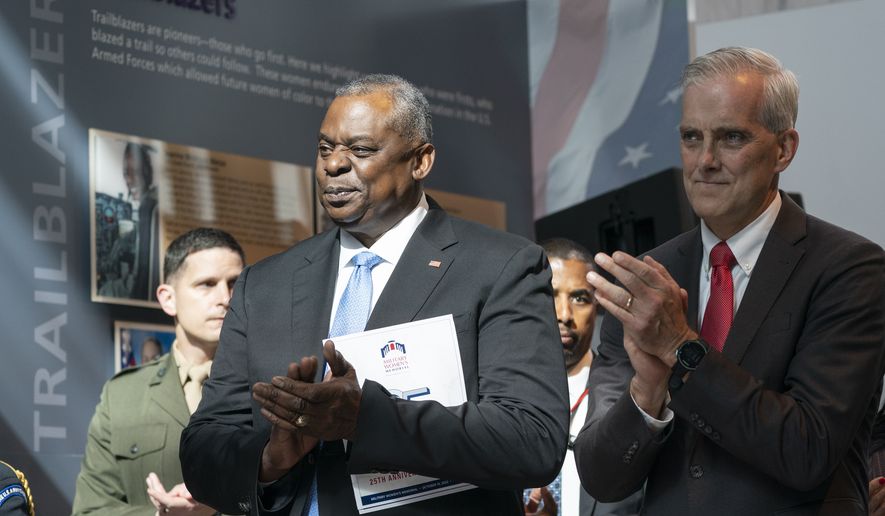Veterans Affairs Secretary Denis McDonough and Defense Secretary Lloyd Austin are speaking up about the debt the country owes to those who serve in uniform.
“Veterans are the keepers of the national ethos in so many ways,” Mr. McDonough told a VA town hall meeting this week as Veterans Day approached.
For those who serve alongside those in uniform, the system has problems that limit the attraction and feasibility of a military career, veterans groups say.
Advocates for military families say unemployment and underemployment are major concerns for military spouses and directly affect their financial stability. For the past decade, men and women married to military personnel have had an unemployment rate of about 22%, making them one of the highest unemployed demographics in the U.S.
Surveys show that an overwhelming percentage of military families think the unique nature of life in the armed forces, especially the frequent moves, affects a spouse’s ability to find jobs at their experience or education level. Most agree or strongly agree that military service negatively affects their own careers.
“The role of a military spouse is far too often unsung,” said Eric Eversole, president of Hiring Our Heroes, which seeks to connect the military community to U.S. businesses. “With an unemployment rate that is two to four times higher than that of their civilian counterparts, military spouses are one of the most unemployed and underemployed sectors of the job force.”
Hiring Our Heroes recently conducted a survey in collaboration with Syracuse University’s D’Aniello Institute for Veterans and Military Families and First Command Financial Services Inc. to study the costs of military spouse unemployment.
Some of the findings are sobering. Many military spouses are unable to save for retirement, and more than half cannot fully vest in employer-sponsored retirement benefit programs. Those unable to work full time doubt their ability to maintain a standard of living during retirement.
“These results show the financial impact of military spouse unemployment is cumulative rather than temporary, impacting the ability to save for retirement over time,” said Deborah Bradbard, a senior research associate at Syracuse University’s Institute for Veterans and Military Families.
The Pentagon says it has made a priority of reducing a long-standing complaint of military families: the burden associated with occupational licensing.
Spouses of service members typically have to make several moves across state lines and even abroad during the course of a military career. More than 30% who are in the labor force are required to be fully licensed, and almost 20% say they have had challenges maintaining their licenses when duty takes them to new states or jurisdictions, the Defense Department said.
“With military spouses, the main issue is that licenses don’t transfer easily across state lines,” said Shoshana Weissmann, an analyst who works on occupational licensing reform for R Street, a public policy think tank in Washington.
“What you need is for licenses to transfer quickly, but there’s another problem: Not every state licenses everything,” she said.
Some spouses are in career fields with loose regulations in one state and more stringent licensing requirements after a transfer. Getting states to harmonize licensing standards or honor the vocational license of a military spouse after a move has proved difficult.
“This has to be up to the states now and getting them interested,” Ms. Weissmann said. “They just don’t understand how much this affects people. It’s a small amount of the population, but it matters.”
Mr. Austin has told Pentagon officials to accelerate the development of interstate licensing “compacts” and to increase the use of noncompetitive, direct-hiring authorities for military spouses.
“Military spouses provide the strong foundation upon which their loved ones in uniform stand — and our communities and our nation rely on their resilience. We owe them our energetic, unwavering support,” Mr. Austin wrote in a recent memo.
In 2011, the Defense Department established the Military Spouse Employment Partnership to link family members with potential employers. More than 600 companies have signed up to recruit and retain military spouses.
Gilbert R. Cisneros Jr., the undersecretary of defense for personnel and readiness, said the program has helped connect more than 250,000 military spouses to employment opportunities across all industry sectors.
The North American division of Swiss Post Solutions, an international document management company, is one of the employers signed up with the partnership.
“We find that military spouses are a good fit as service professionals supporting SPS clients,” said Don Moscatiello, CEO of the company’s North American operation. “We thank our service members and their spouses for the service and sacrifice, and we look forward to continuing our relationship with MSEP.”
• Mike Glenn can be reached at mglenn@washingtontimes.com.




Please read our comment policy before commenting.